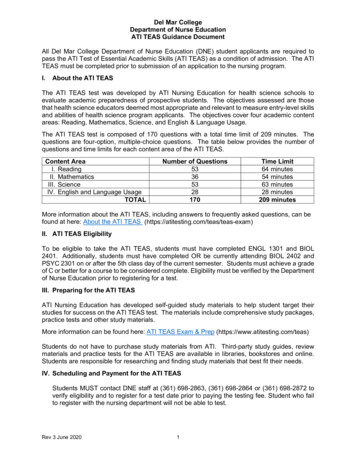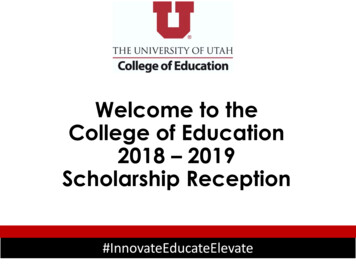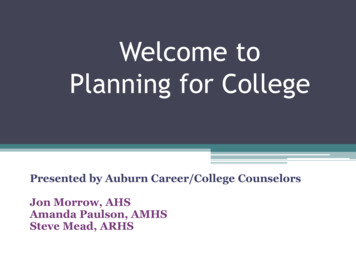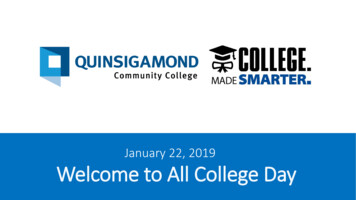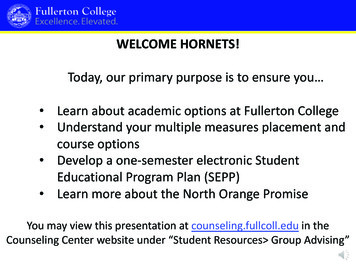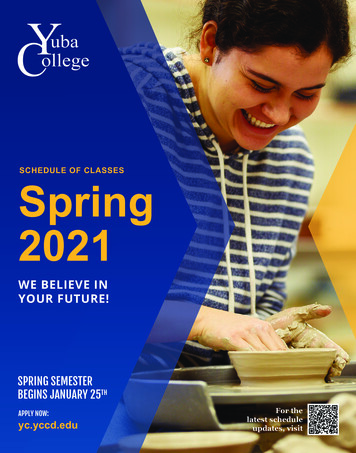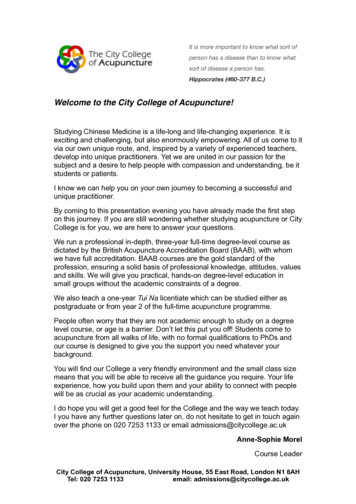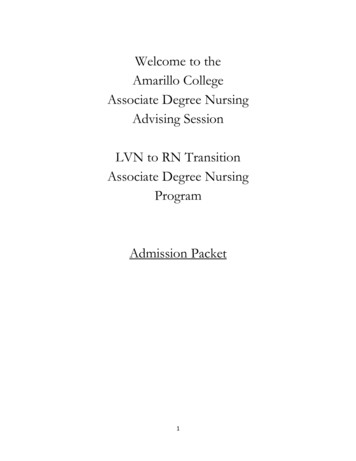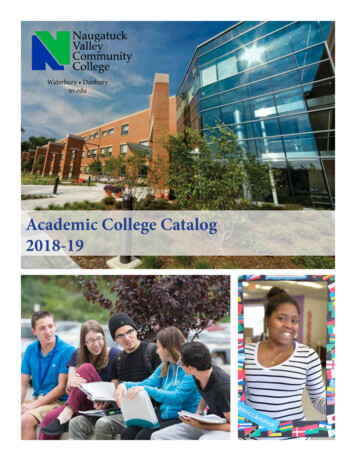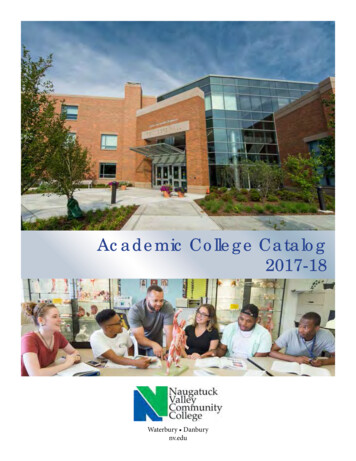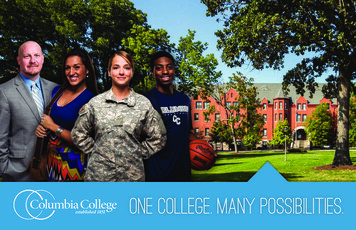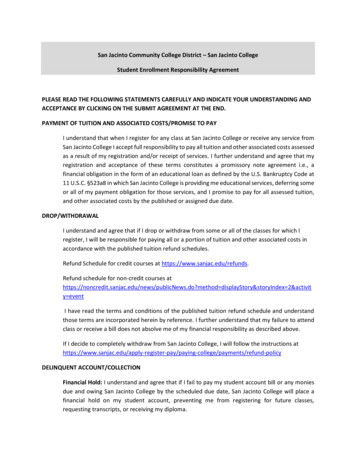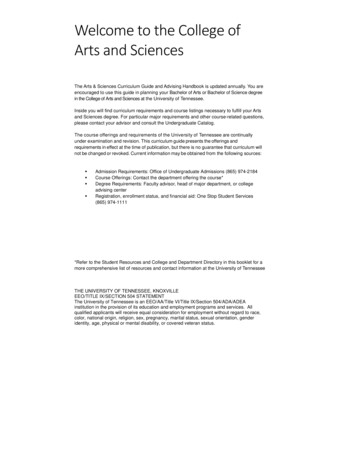
Transcription
Welcome to the College ofArts and SciencesThe Arts & Sciences Curriculum Guide and Advising Handbook is updated annually. You areencouraged to use this guide in planning your Bachelor of Arts or Bachelor of Science degreein the College of Arts and Sciences at the University of Tennessee.Inside you will find curriculum requirements and course listings necessary to fulfill your Artsand Sciences degree. For particular major requirements and other course-related questions,please contact your advisor and consult the Undergraduate Catalog.The course offerings and requirements of the University of Tennessee are continuallyunder examination and revision. This curriculum guide presents the offerings andrequirements in effect at the time of publication, but there is no guarantee that curriculum willnot be changed or revoked. Current information may be obtained from the following sources: Admission Requirements: Office of Undergraduate Admissions (865) 974-2184Course Offerings: Contact the department offering the course*Degree Requirements: Faculty advisor, head of major department, or collegeadvising centerRegistration, enrollment status, and financial aid: One Stop Student Services(865) 974-1111*Refer to the Student Resources and College and Department Directory in this booklet for amore comprehensive list of resources and contact information at the University of TennesseeTHE UNIVERSITY OF TENNESSEE, KNOXVILLEEEO/TITLE IX/SECTION 504 STATEMENTThe University of Tennessee is an EEO/AA/Title VI/Title IX/Section 504/ADA/ADEAinstitution in the provision of its education and employment programs and services. Allqualified applicants will receive equal consideration for employment without regard to race,color, national origin, religion, sex, pregnancy, marital status, sexual orientation, genderidentity, age, physical or mental disability, or covered veteran status.
Table of ContentsCOLLEGE AND DEPARTMENT DIRECTORY . 3ADVISING: THE VOLUNTEER EXPERIENCE . 6UNIVERSAL TRACKING: uTrack . 10DEGREES & PROGRAMS . 11THE EXPLORATORY STUDENT . 18B.A. AND B.S. DEGREE REQUIREMENTS . 19FOUNDATIONS . 20PERSPECTIVES . 20CONNECTIONS . 21ARTS & SCIENCES CURRICULUM: . 22FOUNDATIONS: . 22FIRST YEAR ENGLISH COMPOSITION. 22COMMUNICATION THROUGH WRITING:. 23COMMUNICATING ORALLY . 29QUANTITATIVE REASONING . 31PERSPECTIVES . 32ARTS AND HUMANITIES . 32NATURAL SCIENCES . 36SOCIAL SCIENCES . 38FOREIGN LANGUAGE . 40NON‐US HISTORY . 43GLOBAL CHALLENGES . 44CONNECTIONS . 47MAJORS AND MINORS . 64INTERDISCIPLINARY PROGRAMS . 65HONORS OPPORTUNITIES . 65ADVANCED PLACEMENT . 66RESOURCES FOR STUDENTS . 70ACADEMIC ADVISING TERMS . 72
COLLEGE AND DEPARTMENT DIRECTORYNote: Additional questions about Interdisciplinary programs may be directed tothe College of Arts and Sciences Advising Services office at 865‐974‐4481.Africana StudiesFor information, email:chodges@utk.eduAmerican StudiesFor information, email: lsacco@utk.eduAnthropology250 South Stadium Hall974‐4408Art213 Art and Architecture Building974‐3407Asian StudiesFor information, email: njh@utk.eduAstronomy401 Nielson Physics Building974‐3342Biochemistry, Cellular & MolecularBiologyM407 Walters Life Sciences Building974‐5148Biology, Division of402 Hesler974‐6841Chemistry552 Buehler Hall974‐3141Cinema StudiesFor information, email:cmaland@utk.eduClassics1101 McClung Tower974‐5383Earth and Planetary Sciences306 Earth and Planetary SciencesBuilding974‐2366Ecology and Evolutionary Biology569 Dabney Hall974‐3065Economics507 Stokely Management Center974‐3303English301 McClung Tower974‐5401Geography304 Burchfiel Geography Building974‐2418Global StudiesFor information, email:handelsman@utk.eduHistoryDunford Hall, 6th FloorJudaic StudiesFor information, email:hsinnreich@utk.eduLanguage and World Business701 McClung TowerLatin Americana & Caribbean StudiesFor information, email: kellyjm@utk.eduLinguisticsFor information, email:hbowden1@utk.eduMathematics227 Ayres Hall974‐2461Medieval & Renaissance StudiesFor information, email:jrubens1@utk.edu974‐1859MicrobiologyM409 Walters Life Sciences Building974‐3441Middle East StudiesFor information, email:cshepard@utk.edu974‐5421974‐2311
Modern Foreign Languages &Literatures701 McClung Tower974‐2311Music117 Natalie L. Haslam Music Center974‐3241NeuroscienceFor information, email: jhall1@utk.eduPhilosophy801 McClung Tower974‐3255Physics401 Nielson Physics Building974‐3342Political Science1001 McClung Tower974‐2261Psychology307C Austin Peay974‐3328Religious Studies501 McClung Tower974‐2466Sociology901 McClung Tower974‐6021Statistics255 Stokely Management Center974‐5544Sustainability304 Burchfiel Geography Building974‐2418Theatre206 McClung Tower974‐6011Women, Gender, and SexualityFor information, email:rmgolden@utk.eduOTHER UNIVERSITY DEPARTMENTS AND RESOURCESAgricultural Sciences and NaturalResourcesAgriculture126 Morgan Hall974‐7303Agricultural and Resource Economics302 Morgan Hall974‐7231Agricultural Leadership, Education, &Communications320 Morgan Hall974‐7371Animal Science149 Brehm Animal Science974‐7286Biosystems Engineering & Soil Science101 BESS974‐7266Entomology & Plant Pathology370 Plant Science Building974‐7135Food Science and Technology101 Food Safety & Processing Building974‐7331Forestry, Wildlife, and Fisheries274 Ellington Plant Science Building974‐7126Plant Sciences252 Ellington Plant Science Building974‐7324224 Art and Architecture Building974‐5265A332 Bailey Education Complex974‐8194Engineering Advising316A Perkins Hall974‐4408Associate Dean for Academic andStudent Affairs101 Perkins Hall974‐2454Architecture and DesignAdvising CenterEducation, Health, and HumanSciencesAdvising CenterEngineeringNursing
Advising Center203 Nursing Building974‐7606109 Henson Hall974‐3351Social WorkSocial WorkOther ResourcesDean of Students413 Student Services Building974‐3179Center for Career DevelopmentStudent Union, Level 2974‐5435Student Counseling Center1800 Volunteer Boulevard974‐2196Disability Services100 Dunford Hall974‐6087Center for International Education1620 Melrose Place974‐3177Student Health Center1800 Volunteer Boulevard974‐3135Student Success Center324 Greve Hall946‐6641Veteran Student Services209 Student Services974‐1500Admissions Office320 Student Services974‐2184One Stop Express Student ServicesHodges Library Ground Floor974‐1111Parking & Transit Services2121 Stephenson Drive974‐6031University Housing405 Student Services974‐2571VolCard (UT ID Office)472 South Stadium Hall974‐3430
ADVISING: THE VOLUNTEER EXPERIENCEAt UT, academic advising is all about you! As a student, you’ll work withyour advisor to create an academic plan with an emphasis on self andcareer exploration and opportunities for experiential learning.From orientation through graduation, you and your academic advisor will: Define your personal, educational, and career goals; Explore the general education curriculum and how those coursesrelate to your future major and career; Explore major and career options; Determine which university resources and programs will help yoube a successful student; Identify co-curricular, experience learning, and leadershipopportunities to support your academic and professional growth;and Create your personal UT academic plan.We look forward to working with you throughout your Volunteerexperience, so please don’t hesitate to contact your advisor if you haveany questions. http://artsci.utk.edu/advising/
ARTS AND SCIENCES: Planning for Your FutureOur mission in the College of Arts and Sciences is to educate innovative citizen leaders.The College’s programs emphasize not only the importance of the world around us, but alsothe challenge of the intellectual process, the need for communication skills, and the ability torespond to change. Our graduates learn everything important for building their future,creating a meaningful life, and pursuing a number of careers over a lifetime.Our goal in Arts and Sciences Advising Services is to guide undergraduate students indeveloping and implementing sound educational plans. We are here to help ensure that yourplans are consistent with your values and your academic and career goals. Our purpose isto encourage you to become self-directed learners and decision-makers.Theresa M. Lee, DeanCollege of Arts and SciencesACADEMIC AND CAREER PLANNINGA liberal arts education is preparation for life, and students must work assertively anddiligently to acquire this type of education.FRESHMAN YEAR Be deliberate in selecting your General Education classes. Choose them for theskills they help you develop and the opportunity they provide to learn more aboutsubject areas of interest.Explore majors and careers at the Center for Career Development and on thewebsite at: career.utk.edu.Use “What Can I Do with This Major?” to learn about majors of interest.Take the Strong Interest Inventory and Type Focus assessments.Enroll in a First Year Studies 101 course. Special sections are available forExploratory students.Consider an Exploring Majors and Careers class (Counselor Education 205) in thespring of your freshman year.Meet with your academic advisor to discuss your academic goals and a careercounselor to discuss your career goals.Participate in campus co-curricular activities.Commit yourself to a strong academic start. The momentum you build can carryyou through the next three years.Strengthen your written communication skills in English classes and writing labs.Discover UT resources including the Student Success Center, Student CounselingCenter, and tutorial services.SOPHOMORE YEAR Attend the Explore CAS event in the spring to meet faculty and students in theArts and Sciences departments.Talk to professionals in career fields you are considering.Get to know faculty in your major or a major you are considering; they can talkabout career options and provide a letter of reference for jobs or graduate school.Start identifying part-time and summer employment, volunteer work or internshipsin your areas of interest; attend the Spring Job and Internship Fair.Develop a professional quality resume and register with Hire-A-Vol for internshipopportunities.
Plan for a study abroad experience.JUNIOR YEAR Obtain work experience in your field through part-time employment, internship,practicum, field work, or volunteer experiences; clarify your career goals.Choose electives to enhance your qualifications, especially your oral and writtencommunication skills.Seek leadership positions in co-curricular activities; join career-related studentprofessional associations.Begin to plan for job search or graduate school; set deadlines for required steps.Update your resume in Hire-a-Vol.Attend various job fairs sponsored by Career Development.Meet with a career counselor to discuss job search strategies.Take electives in areas beyond your major to improve your qualifications andexpand your knowledge.SENIOR YEAR Register for on-campus interviewing and resume referral through the Center forCareer Development.Participate in Career Development job fairs.Search Hire-a-Vol and other relevant sites for job postings.Attend Career Development workshops and conduct a practice interview.Research companies or graduate schools of interest.Meet required deadlines for graduate school or job search.Conduct a thorough job search campaign in addition to on-campus interviews.Enroll in “Career Strategies for the Arts and Sciences” (Counselor Education 404).Checklist for career success provided by University of Tennessee Center for CareerDevelopment, Student Union 2nd level, 974-5435, http://career.utk.edu.
ACADEMIC ADVISING IN THE COLLEGE OF ARTS AND SCIENCESThe University of Tennessee recognizes academic advising to be a critical component of theeducational experience and student success. Faculty mentors and professional staffpromote academic advising as a shared responsibility with students. Academic advisingserves to develop and enrich student educational plans in ways that are consistent with theirpersonal values, goals, and career plans, preparing them for a life of learning in a globalsociety.You will be assigned to an academic advisor before you even begin classes at UT. Thisprofessional advisor will provide an introduction to the values of College of Arts andSciences and a liberal arts education and a broad introduction to the major discipline. By theend of your Sophomore year, you will also be assigned to a faculty mentor. The facultymentor will provide the unique insight to the practices, opportunities, and values of yourchosen discipline as they work with you to refine your academic plan and your career plans.The Advising Policy:Prior to enrolling for the first time at the university, all degree-seeking first-year students andtransfer students are required to meet with an academic advisor. Readmitted students mustalso meet with an academic advisor prior to reenrolling. Advising policies vary by college.Information in this guide refers to the advising policy for the College of Arts and Sciences.For information about advising policies for other colleges, please refer to the Advising Centerfor that college. All students with fewer than 30 hours at UT Knoxville (45 for Arts and Sciences)Students following Exploratory tracksStudents identified as "off track" by uTrack*Students on Academic ProbationAll other students are required to consult with an advisor for a substantial conference duringa designated semester each year. Students whose ID numbers end in an even digit are required to meet with anadvisor during fall semesterStudents whose ID numbers end in an odd digit are required to meet with anadvisor during spring semesterAll students are encouraged to consult with their advisors at any time. The student,not the advisor, bears the ultimate responsibility for educational planning, selecting courses,meeting course prerequisites, and adhering to policies and procedures. Assistance tostudents with academic problems or questions is provided by professors, advisors,department heads, and college deans or advising centers.
UNIVERSAL TRACKING: uTrackThe University of Tennessee is committed to helping you achieve your academic goals andcomplete them in a timely manner. Most of the degree programs at UT are designed to becompleted in four years, and policies are in place to help you keep track of your progresstowards a degree by meeting certain milestones along the way.The University of Tennessee has implemented Universal Tracking (uTrack), an academicmonitoring system designed to help students stay on track for timely graduation. uTrackrequirements only affect full-time, degree-seeking students. The policy is as follows:Policy Students must declare a major or exploratory track at the time they are admitted tothe university. Some majors have a competitive admissions process.All students must transition out of exploratory tracks into a major track no laterthan the end of the fourth tracking semester at UT.Students who are off track must develop an advisor-approved plan for gettingback on track before they will be allowed to register for future tracking semesters.Students who are off track for two consecutive semesters will be placed on holdand required to select a new major that is better aligned with their abilities.CAN YOU GRADUATE IN FOUR YEARS? YES!Part of the expectation for the four year graduation plan is that you will carefully plan a year’sworth of work at a time and that you will have a general plan for your entire academic career,term by term. During your first year, your advisor will be able to provide you with moreinformation about how to plan for your university study.Suggestions to ensure degree progression: Complete the freshman writing requirement in the first year.If you are Exploratory, enroll in a First-Year Studies course and see your advisorregularly. Additional tips for Exploratory students can be found later in this guide.Monitor your own progress and seek advice from your advisor.Schedule your advising appointments early in the term to allow for follow-up visits.Register on your assigned eligibility date to ensure access to the classes youneed for your major.Complete 30-36 credit hours each academic year.Utilize summer courses.Maintain good academic standing.
DEGREES & PROGRAMSCOLLEGE OF ARTS & SCIENCESMajors, Minors, and ConcentrationsAbbreviations: BA Bachelor of Arts; BFA Bachelor of Fine Arts; BM Bachelor of Music;BS Bachelor of Science; BSC Bachelor of Science in NORAVAILABLE?DEGREETYPEVolsTeach Minorfor Mathematicsand naturalsciences RS,DISPLACEMENT, ANDHUMAN RIGHTSART HISTORYGRAPHIC DESIGNARTARTDIVISION OF BIOLOGYCHEMISTRYCLASSICSBIOLOGICAL SCIENCESCHEMISTRYCLASSICSART EDUCATIONTWO DIMENSIONALTHREE DIMENSIONALFOUR DIMENSIONALGENERALBIOCHEMISTRY &CELLULAR ANDMOLECULARBIOLOGY (BCMB)HONORS BCMBECOLOGY &EVOLUTIONARYBIOLOGY (EEB)HONORS EEBMICROBIOLOGYHONORSMICROBIOLOGYYGENERALHONORS CHEMISTRYBACHELOR OFSCIENCE INCHEMISTRYHONORS BACHELOROF SCIENCE INCHEMISTRYCLASSICALARCHAEOLOGYHONORS CLASSICALARCHAEOLOGYCLASSICALCIVILIZATIONHONORS CLASSICALCIVILIZATIONGREEKHONORS A.MINORAVAILABLE .C.YESNOYESNOYESNOB.A.
EARTH ANDPLANETARY SCIENCESECONOMICSENGLISHGEOGRAPHYGEOLOGY STAINABILITYLATINHONORS LATINGEOLOGYHONORS IESGENERALHONORS ECONOMICSCREATIVE WRITINGHONORS ALIZEDPROGRAMLITERATUREHONORS LITERATURERHETORIC ANDWRITINGHONORS RHETORICAND WRITINGTECHNICALCOMMUNICATIONHONORS TECHNICALCOMMUNICATIONCLIMATE ANDCLIMATE CHANGEHONORS: CLIMATEAND CLIMATECHANGEGEOSPATIALSCIENCE ANDTECHNOLOGYHONORS:GEOSPATIALSCIENCE ANDTECHNOLOGYLANDSCAPES ANDENVIRONMENT
The Arts & Sciences Curriculum Guide and Advising Handbook is updated annually. You are . American Studies For information,
